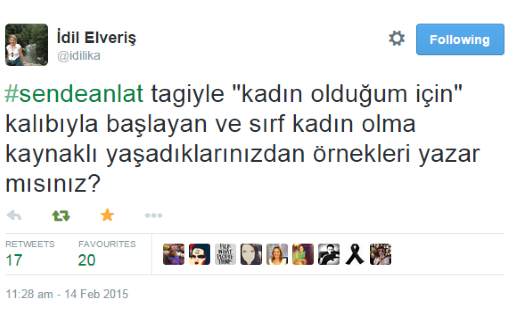Twitter maintains a positive image in terms of protecting user’s privacy and defending their freedom of speech in most of the world. However, in Turkey (and in Russia) users criticize the company for bowing down to the authoritarian regime’s pressure for censoring political speech. The scope of Twitter censorship in Turkey seem to justify these concerns.
Last year, when the allegations of corruption against Erdoğan family and the ministers spread over social media, the Turkish government blocked Twitter and YouTube during the local elections of March 2014. Twitter responded by introducing “country withheld content” tool for the first the time in Turkey. Within three months, Twitter ended up censoring 17 accounts and 183 statuses.
A small step forwards for Twitter, a big step backwards for Turkey
This is how it all started.
On 18 March 2014, a Turkish court issued a ban on an anonymous Twitter account, @oyyokhirsiza (“no vote to the thief”), which leaks corruption allegations against Erdoğan’s ruling party, AKP. The account targeted mainly the AKP mayors and their questionable relationships with the businesses, such as the Minister of Communication, Binali Yıldırım, who was running for the mayorship of İzmir (a port city) and his son who owns a marital company at the age of 24. Mr. Yıldırım and his son were the plaintiffs in this court case which was alleged as a pretext to block Twitter.
On 20 March 2014, Erdoğan promised to “wipe out” Twitter at an election rally, and by midnight access to Twitter was blocked in Turkey.
Twitter appealed the court’s ban, and managed to reverse the decision in an upper court, but also accepted the use of “country withheld content” tool in Turkey in an attempt to lift the nation-wide ban in exchange of censoring a few.
Turkish government unblocked Twitter following the Supreme Court’s ruling, which came after the local elections, but the censorship became the norm.
Twitter censorship in Turkey: Leaks, criticism, satire, porn, and press freedoms
Twitter’s transparency report for the period of January - June 2014 lists 65 content removal requests by Turkish courts and 121 requests by government bodies. Twitter complied with 30% of the requests.
Twitter does not list these accounts and statuses, but it discloses the removal requests on ChillingEffects.org website if they are legally able to do so. Since the Gezi protests of 2013, Twitter has become the independent news agency, so I decided to keep an archive of the removal requests by Turkey and to do a research on what the Turkish government tries to censor. So far, I was able to identify 38 withheld accounts and various withheld tweets to help us understand the patterns of Twitter censorship in Turkey.
Many of the accounts and tweets are censored by court orders and the judges provide “defamation” as the most common justification. However, the contents of the censored accounts and statuses indicate another story: the political leaks and the political criticism or satire are the most visible causes for censorship. Most recently, government’s crackdown on opposition media is spread to Twitter, and the company even censored the news items about leaked documents unlike its treatment of Wikileaks or NSA leaks.
- Political leaks:
@HARAMZADELER333 and @BASCALAN leaks phone taps (in YouTube videos) which allegedly reveal the graft network between the government and businessmen. @CanliEbru and @fuatavnifuat leaks the police raids on opposition and provides the context of the business interests of Erdoğan and his entourage. @TheRedHack is the leftist hacker group and their long list of hacks often target government websites to spread their political messages. Twitter briefly suspended their account, but currently it is only withheld in Turkey.
- Criticism and satire:
The @CSagir account, which belongs to the managing editor of the daily Today’s Zaman, is the first censored account that has a non-anonymous user. The plaintiff, Erdoğan himself, demanded an extensive ban on any future Twitter account of Mr. Sağır. His substitute accounts @CelilSgr and @csagir2014 were also banned accordingly. A month later, the office of the Zaman daily was raided by police, and the editor in chief was held in custody for 3 days.
A more concerning method of censorship adopted to by the government is to search for political criticism on Twitter and ban them en masse; such as the Minister of Communication taking a legal action to ban 68 different statuses in one court decision. Most of the statuses read that the minister is stupid, shallow or rude, and that he doesn’t deserve to be a minister. Besides, none of the accounts have a significant number of followers, and many were not retweeted. Apparently, the minister searched for his name “Lütfi Elvan” (and also its common misspelling, “Lütfü Elvan”) to censor the criticism on Twitter.
The worst part of this case is that the Minister of Communication negotiated with Twitter policy officers in April 2014 who agreed on the scope of country withheld content tool in Turkey. Only a week after Twitter “toes the line” as the government boasted, Mr. Elvan became the first abuser of the tool.
- Porn:
There are only 4 accounts that are banned for sharing pornographic material and Twitter accepted the administrative order of the Turkey’s internet watchdog, TİB. Considering the vast number of adult accounts on Twitter, Turkish government’s main target appears to be the political speech.
- Press Freedoms:
On 13 January 2015, a leftist hacker with the handle @LazepeM leaked the sealed court documents which allegedly show that Turkish intelligence provided arms to anti-government forces in Syria. Within 24 hours, a court banned @LazepeM and 9 other accounts on the grounds of defamation to the Turkish intelligence agency and national security, another court also issued a gag order about the leaks which also banned the official Twitter account of the leftist daily @BirGun_Gazetesi.
Twitter issued a statement that it will not withhold access to entire account of the daily, but will withhold certain tweets of the daily and several others who retweeted it.
Which tweets are withheld, and which criteria was used is unclear. But I traced 6 statuses that are withheld by Twitter. These tweets do not share the leaked documents per se, they only share the links to the news articles on their own news website about the leaks and about the gag orders. By withholding these particular statuses, Twitter creates a dangerous precedent that sharing links that Turkish courts ban can also be censored. Considering that Turkey bans 65.539 websites, such censorship would be extreme.
The faces of Twitter
The Turkish Minister of Communication recently revealed that 86 accounts were withheld by Twitter during the #Kobane protests in the Kurdish cities, and that the company complied with 255 content removal requests out of 338 so far.
Next week, Twitter will release the transparency report for the second half of 2014. Based on the data we have, it is safe to assume that Turkey will again be the country with most removal requests. But it will also show that the company complies with that.
Last year, the US made requests about 42 accounts, 5 of them were based on court orders, but Twitter did not comply with any. Pakistan made 101 requests, but Twitter restored access to all content “in the absence of additional clarifying information from Pakistani authorities.”
But when it comes to Turkey (and Russia), Twitter seems to bow down much too easily and much too often. This is concerning.
Twitter had reached a 30% penetration rate in Turkey after the Gezi protests when people lost their trust in the mainstream media. Twitter’s service has an instrumental role in the right to information in Turkey, both the journalists and the readers want to keep it that way, hence its user profile is politically active. So much so that when the government blocked the access, users switched to open DNS and VPN services and made the headlines by the #TurkeyBlockedTwitter hashtag.
But as Aral Balkan reminds us, Twitter is not a public space, and we are not entitled to freedom of speech on Twitter, the company grants us that only voluntarily.
Therefore, it should be made clear that the relationship between users and the Twitter can only last as long as there is a mutual benefit. I think the Turkish users honored their part of the deal, and they expect from Twitter nothing less.
* This article first appeared on The Daily Dot.







